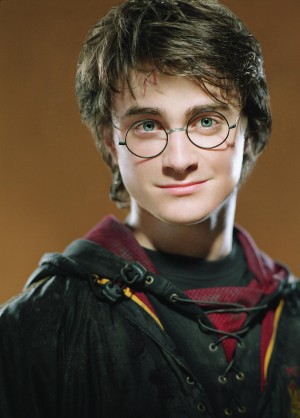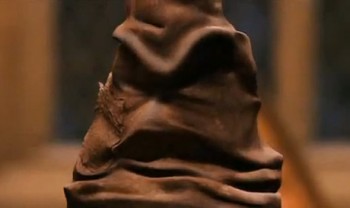*Warning: Spoilers for all seven Harry Potter books and movies follow. If you haven’t read the complete series, step away from the computer. Also, what rock have you been hiding underneath?
If you haven’t read Part I and Part II of this blog series, I highly recommend you toddle on over and catch up before continuing with this one. Also, lest any of you read too deeply into my criticism and get all steamed up, let me remind you that I love these books and this is meant to be a humorous take on the Harry Potter universe, not serious literary criticism.
So, now that’s over with, I present to you the third (and final) absurdity in the Harry Potter books that I only considered as an adult…
3. Deus Ex Machina

At least I’m good at Quidditch,
right? Amirite? Anybody?
Harry Potter is nominally the hero of all seven Harry Potter books. Obviously. But when you really take a long hard look at each and every triumphant moment in the books, it quickly becomes clear that Harry isn’t much of a hero at all. Not to say that he doesn’t have heroic intentions, but from a purely literary perspective, Harry isn’t even much of a protagonist. He is a generally passive character whose fate frequently gathers him up and sweeps him along at a brisk and dangerous pace. And Harry is absolutely a survivor, but a hero? I’m not so sure. Because nearly all of Harry’s successes in the books come down to one of two things: “other people” or “by accident.”
In the first few books–which solidly fall into the children’s lit genre–Harry’s characterization works. He is lost, confused, and ineffectual, bobbing along in a swift current made up of the history and politics of a world he doesn’t fully understand. He’s also eleven. And these sorts of “everyman” characteristics made it easy for child readers to relate to Harry, to put themselves in his shoes. He wasn’t supposed to be a hero yet–just the Boy-Who-Lived, someone whose destiny has big plans for them. But then the third book came along, and the fourth, and still an adolescent Harry lurked in mediocrity, relying on his friends and elders to support him through the trials thrown at him again and again.
I understand that J. K. Rowling loves to emphasize the power of strong friendships and communities, but I actually can’t think of a single instance off the top of my head where Harry won some victory or defeated an enemy without the express help of his friends. And let’s be honest, that friend is mostly Hermione. Time and again Hermione saves Harry’s skin with her extensive knowledge of Hogwarts, magical minutiae, and wizarding history. But Hermione isn’t the only one on whom Harry relies for help. The Goblet of Fire is a great example of this–Harry doesn’t get through a single Triwizard Tournament trial without someone telling him what he was in for ahead of time. Hagrid sneaks Harry out to see the dragons; Cedric Diggory hints that Harry should take his golden egg into the bathtub; Dobby miraculously shows up with gillyweed so Harry doesn’t summarily drown in the Hogwarts lake.
Harry is utterly reliant on his friends and mentors to complete even the simplest of tasks, and has very little agency of his own. And if you think I’m over-stating the influence of Harry Potter’s friends, let me remind you that in the Deathly Hallows Dumbledore actually talks Harry out of being dead. Yep. Harry dies, and then Dumbledore says he should probably resurrect now. What?
And when Harry isn’t having his booty saved by Hermione or Dumbledore, he succeeds through pure chance. Harry’s very existence is an example of the blatant deus ex machina used throughout the series–he is saved from Voldemort by the “protection of a mother’s love,” because Lily Potter was apparently the first woman to ever love her child. In The Chamber of Secrets Harry jams the Sorting Hat (which Fawkes has just kindly delivered him for being loyal to Dumbledore) onto his head, and voila! Out pops the very thing he needs to defeat the basilisk. And then the phoenix just happens to produce magical tears that cure Harry of the deadly basilisk poison coursing through his veins just before he keels over. And don’t let me forget about the Room of Requirement, which, if you think hard enough about it, is like a meta-literary commentary on plot-devices as a whole. Except it isn’t.
Phew. Anyway, I think you get my point. Harry’s a nice enough guy, but he’s border-line awful at magic and he certainly wouldn’t have saved the world without a army of competent wizards and amazingly good luck. Maybe Dumbledore was actually supposed to be the hero. At least he seems to know what’s going on.
Hope you enjoyed my Harry Potter and the Illiterate Wizards series! See you next week for more fun and games.


Great article, Thanks for writing.